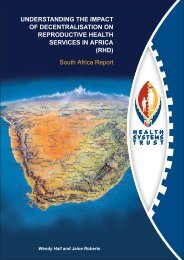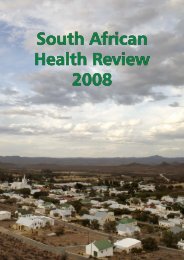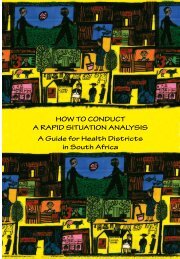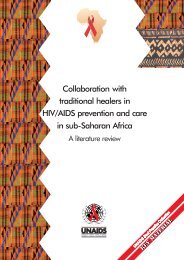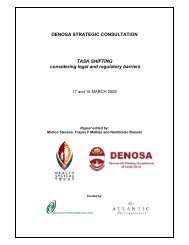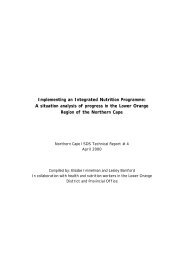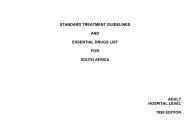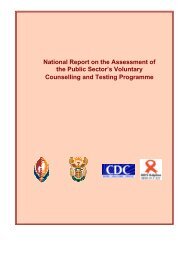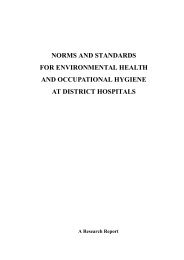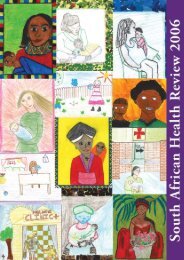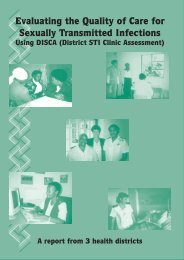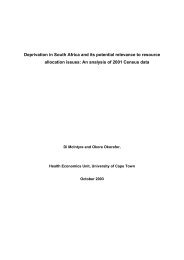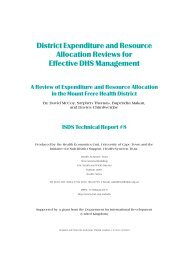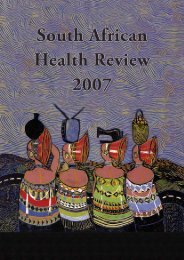COMMUNITY BASED SITUATIONAL ANALYSIS Maternal and ...
COMMUNITY BASED SITUATIONAL ANALYSIS Maternal and ...
COMMUNITY BASED SITUATIONAL ANALYSIS Maternal and ...
You also want an ePaper? Increase the reach of your titles
YUMPU automatically turns print PDFs into web optimized ePapers that Google loves.
majority of the women (72%) were cared for by female relatives (either by mothers, sisters or<br />
aunts). Five of the deaths (28%) occurred in women who were having their first pregnancy.<br />
The age of half of the women who died was known <strong>and</strong> of these only one fell outside the<br />
reproductive years (39 years), if South African criteria are used. Most of the pregnancies were<br />
full term. The demographic profiles were similar to those found in these study sites previously. 7<br />
Causes of Death<br />
Generally causes of death fell into 3 categories:<br />
• AIDS related - 12 (67%)<br />
• Other non-pregnancy related infection - 3 (16.5%)<br />
• Direct perinatal causes - 3 (16.5%)<br />
Deaths were classified as AIDS-related if women were known to be HIV-positive <strong>and</strong>/or had<br />
classic symptoms of AIDS (weight loss, chronic diarrhoea, loss of appetite, chronic cough, TB,<br />
oral lesions, confusion, unable to care for self). There was one known HIV-positive woman<br />
who died of an acute infection <strong>and</strong> one woman with chronic diarrhoea with unknown HIV status<br />
who were also classified as AIDS-related deaths. All but two of these 12 women were no<br />
longer able to care for themselves at the time of death.<br />
The women with other non-pregnancy related infections all died with symptoms suggesting<br />
infection, which lasted one week or less but did not appear to be directly related to pregnancy.<br />
The HIV serological status of these women was unknown.<br />
Finally, the direct perinatal causes included placenta praevia with postpartum haemorrhage,<br />
possible anaesthetic accident <strong>and</strong> post-partum/perinatal infection. This last case also<br />
appeared to involve potential negligence as the woman had had two prior caesarean sections<br />
<strong>and</strong> was admitted to the hospital in labour but not delivered (by caesarean section) until two<br />
days later.<br />
In five of the cases a death certificate was available for review. One stated AIDS, one TB <strong>and</strong><br />
the other three "Natural Causes".<br />
Time of Death<br />
All but one mother died post-partum. The only woman who died in the antenatal period was<br />
five months pregnant with probable AIDS-related symptoms of chronic diarrhoea, weight loss,<br />
etc. The time of the postpartum deaths ranged from five hours to nine months, with a median of<br />
one month. It must be noted that the deaths of women involved in the Good Start study in<br />
Umlazi were selected to favour earlier rather than later postpartum deaths.<br />
The women with an AIDS-related death had been ill between one week <strong>and</strong> 12 months, with<br />
the majority having been ill for more than three months, <strong>and</strong> a median of 4.5 months of illness<br />
prior to death. The other two categories died from a few hours to one month after onset of<br />
illness. All but one died within a week. The woman who died at one month was a likely<br />
anaesthetic accident who never woke up post-caesarean section <strong>and</strong> died after one month in a<br />
coma.<br />
Place of Death <strong>and</strong> Availability Transport<br />
Twelve of the eighteen deaths occurred in a hospital or hospice setting. Four occurred at home<br />
as they had left the health facility to "die at home". Two deaths occurred on the way to the<br />
hospital. One was an AIDS-related death who had been in <strong>and</strong> out of the hospital repeatedly.<br />
Community Based Situation Analysis: <strong>Maternal</strong> & Neonatal Follow-up Care 24



